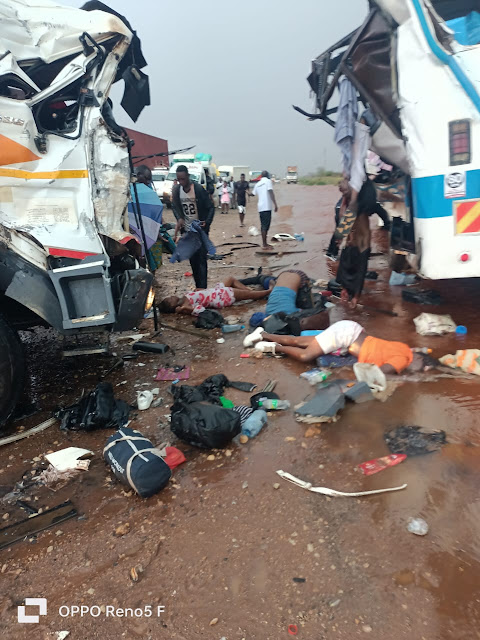Search This Blog
"Truth comes only to conquer those who have lost the art of receiving it as a friend." ~ Ravi Thakur
Featured
- Get link
- X
- Other Apps
Kenya's Road Safety Crisis: Murkomen's Callous Joke Exposes Government Negligence
Today's tragedy involving Kenyatta University students underscores Kenya's road safety crisis. With over 4,100 lives lost in 2023 alone and 649 deaths in the last two months, it's time for serious action, not callous jokes from government functionaries like Kipchumba Murkomen.
In a nation plagued by road accidents and tragedy, today's incident involving Kenyatta University students starkly highlights Kenya's road safety crisis. The loss of 11 young lives in a horrific accident in Voi is not just a statistic; it's a testament to the government's negligence and the dire state of Kenyan roads.
As families mourn their loved ones and the nation grapples with yet another preventable tragedy, one cannot help but recall the callous joke made by Roads and Transport Cabinet Secretary, Kipchumba Murkomen, just weeks ago. Murkomen's assertion that "poor roads are safer because they don't cause accidents" is not only insensitive but also a glaring reflection of the lack of seriousness with which he approaches his role.
Kenya's roads have become synonymous with danger, claiming the lives of thousands each year. According to statistics from the National Transport and Safety Authority (NTSA), a staggering 649 people have lost their lives in road accidents in the last two months alone. In 2023, over 4,100 lives were lost on Kenyan roads, a number that doubles the death toll of the 9/11 terror attack on the World Trade Centre. It's like two 9/11s happened in Kenya last year.
Murkomen's flippant remark not only trivialises the suffering of those affected by road accidents but also underscores the absence of a coherent road safety policy under the Kenya Kwanza government. While other nations invest in infrastructure and implement stringent safety measures, Kenya continues to lag behind, leaving its citizens vulnerable to the perils of poorly maintained roads and reckless driving.
It's time for action, not jokes, Mr Murkomen.
The government must prioritise road safety, invest in infrastructure upgrades, implement effective regulations, and hold accountable those responsible for maintaining the country's roads.
Families should not have to fear for their loved ones every time they embark on a journey, and students should not have their dreams cut short by preventable accidents.
As the nation mourns the loss of 11 promising young souls, let us not forget the thousands who have perished on Kenya's roads due to negligence and indifference. Let us demand better from our leaders and work towards a future where tragedies like today's are a thing of the past. The time for change is now.
- Get link
- X
- Other Apps
Comments
Popular Posts

The One On Why Uganda Produces Shitty Ads
- Get link
- X
- Other Apps

Of Australian Bogans Masquerading As Creatives In Nairobi Agencies
- Get link
- X
- Other Apps




Before publishing do your homework on the leading cause of accidents, driver's recklessness. Should our leaders be there telling us how to drive? Including this recent case, involving KU students. It's high time we take responsibility for our actions as citizens. Very rare is it due to poor infrastructure.
ReplyDelete